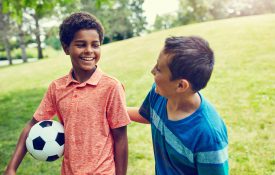-

Childhood Friendships May Have Some Health Benefits in Adulthood
Time spent with friends in childhood is associated with physical health in adulthood, according to data from a multi-decade study of men.
-
Fine-Tune Your B.S. Detector: You’ll Need It
Do you have a good B.S. detector? You need one in our digital age. The skill of spotting false information—rubbish, nonsense and, yes, fake news—is so important these days that scientists have begun serious research on it. They’re attempting to quantify when and why people spread it, who is susceptible to it, and how people can confront it. This month in Atlanta, at the annual conference of the Society for Personality and Social Psychology, a group of psychologists and other scientists presented a symposium on their research. The title? “Bullshitting: Empirical and Experiential Examinations of a Pervasive Social Behavior.” B.S.
-
What’s the Best Way to Inspire Positive Environmental Behavior?
Type "climate change" into any search engine and the results aren't difficult to predict: you'll probably see a woeful polar bear on a shrinking patch of ice. Either that or cracked, parched earth. But a new paper published in Global Environmental Change questions the power of nature to motivate climate action. "Frequently, visual and verbal stimuli used in the media to describe threats of climate change feature plants, animals, and other typical nature depictions," said Sabrina Helm, associate professor of retailing and consumer science at the University of Arizona and lead author of the paper.
-
What Makes Us Vibe?
Think about your friends—the people you spend a lot of time with, see movies with, those people you'd text to grab a drink or dinner after a long week. Now think back to why you first became friends and ask yourself: was it because you like them? Or because you are like them? A recent study, led by Carolyn Parkinson, a psychologist at the University of California, Los Angeles, suggests that the answer may involve a complex network of brain regions that gets to the root of how friendship exists in our brains. When I spoke with her, Parkinson told me that a key focus of her research is learning how social networks might shape or be shaped by how our brains process information.
-
Buying organic makes you selfish, research shows — this explains the Whole Foods parking lot
Last week, a couple in Chapel Hill, N.C., got married in a Whole Foods Market. The newlyweds, Ross and Jacqueline Aronson, described it as the culmination of a dream romance that blossomed during arm-in-arm walks through the aisles of organic produce and goodies, plucking dewy fresh ingredients for the gourmet meals Ross likes to cook for the two of them. I’ve never been to Ross and Jacqueline’s Whole Foods or, for that matter, any Whole Foods that matches the scenes they describe.
-

Testosterone on the Team
A new research report found that testosterone levels are associated with how diverse and homogeneous business teams perform, but in opposite ways.

